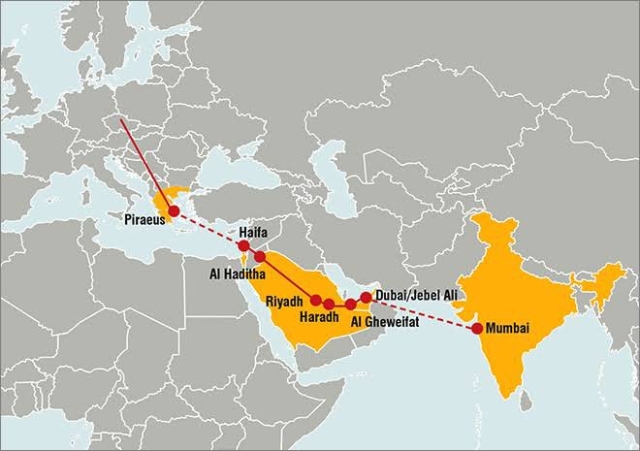In a monumental announcement that promises to redefine geopolitical and economic landscapes, global leaders gathered at the G20 summit in New Delhi to unveil a sweeping rail and port deal, which prominently includes Israel at its fulcrum. The partnership aims to establish vital links between the Middle East and South Asia, and it was unequivocally hailed by Israeli Prime Minister Benjamin Netanyahu as the "largest cooperation project in the history of Israel."
Israel: A Pivotal Connector in a Global Network
Prime Minister Netanyahu emphasized Israel's instrumental role, stating, "Israel will function as a critical junction within this grand economic passageway. Our advanced railways and world-class ports are set to create a multidirectional gateway—from India, across the Middle East, into Europe, and reciprocally."
Thank you to the Biden administration for leading the historic project announced today at the G-20 in India, which will establish an economic corridor between Asia and Europe and go through the Gulf, Jordan and Israel.
— Ambassador Michael Herzog (@AmbHerzog) September 10, 2023
We look forward to working with the U.S. administration and… pic.twitter.com/dRP9yHf9ZA
This initiative couldn't be timelier as the U.S., under President Joe Biden, aims to present itself as an attractive alternative to China's Belt and Road Initiative. Biden declared the deal to be a "real game-changer," fostering a "more integrated, prosperous, and stable Middle East."
A Transformative Leap for Regional and Global Commerce
Jon Finer, the U.S. Deputy National Security Advisor, spotlighted the inclusive benefits of the project, saying it will be particularly advantageous for the low and middle-income nations in the region. "We are looking at a tectonic shift, as this deal enables the Middle East, with Israel at its core, to become a pivotal player in global commerce," said Finer.
Netanyahu also revealed that Israel had been involved in high-level discussions concerning this "historic opportunity" for several months. He elaborated on the initiative's ambitious vision, stating, "This groundbreaking project includes not just the construction of railways but also the development of future-forward infrastructure like hydrogen pipelines, fiber-optic communications cables, and electricity lines."
Prime Minister of Israel announces the country will be a central player in a new international rail/maritime economic corridor linking India, the Middle East, through to Europe.
— Ron M. (@Jewtastic) September 9, 2023
World leaders announce India-Middle East-Europe economic corridor | https://t.co/1XvNHEOh36 https://t.co/ClOa9N4tJ0
A Complex Web of Interconnectivity
Under the memorandum of understanding for the India-Middle East-Europe Economic Corridor (IMEC), participating nations—including the European Union, India, Saudi Arabia, the United Arab Emirates, and the U.S.—commit to a multi-pronged development strategy. The east corridor aims to bridge India with the Arabian Gulf, while the northern corridor would link the Gulf with Europe.
In addition to the railways, plans include laying down cables for both power and data lines and constructing pipelines for renewable hydrogen energy, an emergent technology that could revolutionize power generation.
An Underpinning of Broader Diplomatic Ambitions
Interestingly, this commercial endeavor aligns well with U.S. diplomatic efforts to encourage Saudi Arabia to recognize Israel. Finer concluded, "Not only does this initiative serve to 'turn down the temperature across the region,' it also functions as a vehicle to address and potentially resolve longstanding conflicts."
AIPAC applauds the @POTUS @JoeBiden administration’s ambitious plan, developed together with Israel, that will foster greater economic and security partnerships between America, Israel and our allies across the Middle East, Europe and Asia. https://t.co/R2KkwkxSQC
— AIPAC (@AIPAC) September 9, 2023
The unveiling of this deal serves as an indelible testament to Israel's growing geopolitical importance and its role as a conduit for peace and prosperity in the region.


